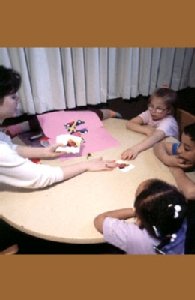Federal grant enables new focus for Speech-Language Graduate Program
New track in master's program to focus on high-needs preschoolers

Last year, more than 700,000 preschoolers were eligible for services under the federal Individuals with Disabilities Education Act (IDEA); 46 percent of those children were identified with speech or language impairments, according to U.S. Department of Education statistics. Because of a national shortage in speech-language professionals, school districts are increasingly hard pressed to provide services for this growing population. High-needs rural and urban districts are especially hard hit.
To be sure, the U.S. Bureau of Labor Statistics projects an increase of almost 20 percent in employment opportunities for speech-language professionals by 2018. To help fill the demand, SU’s College of Arts and Sciences received a five-year, $1.25 million grant from the federal Department of Education’s Office of Special Education to prepare graduate students to work with preschoolers from high-needs rural and urban school districts. Linda Milosky, associate professor and chair of the Department of Communication Sciences and Disorders, is the principal director of the grant. Co-directors are Janet Ford, director of the Gebbie Speech-Language Clinic and assistant professor of clinical practice; and Tanya Eckert, associate professor of psychology and director of the department’s school psychology program.
“There is a critical shortage of speech-language professionals (SLPs), particularly those with the special skills needed to work with children, ages three to five, living in poverty or low-achieving school districts,” Milosky says. “Yet studies repeatedly demonstrate that focused, early intervention in language and pre-reading skills improves children’s reading and language abilities in later years.”
Graduate students who are accepted into the program, called Project Meaningful Differences, will receive a substantial scholarship to cover the majority of their tuition costs, a stipend, and travel expenses to attend professional conferences. In return, the graduates agree to work up to four years in a high-needs rural or urban school to provide speech-language services for preschoolers. “This is an enriched, intensive program for select graduate students who are committed to working with preschool children from high-needs backgrounds,” Milosky says.
In addition to supporting graduate students, the federal grant will support the development of new courses and professional outreach programs for the new preschool track in the department’s speech-language pathology master’s program. The M.S. Program, which is accredited by the Council on Academic Accreditation of the American Speech-Language-Hearing Association, also prepares graduates for certification as a Teacher of Students with Speech-Language Disabilities in New York State. The new coursework will enable Project Meaningful Differences scholars to better understand and work with high-needs preschoolers and their families.
“We are developing an interdisciplinary seminar program that will focus on child development and poverty,” Milosky says. “The seminar will include such topics as nutrition, self-regulation and behavior, family structure, and the psychological impacts of poverty, and will leverage expertise of colleagues across campus.”
Students will also learn to implement a data-collection technique called “single subject design.” Single subject design is a research-based assessment tool that enables practitioners to better determine the impact of their interventions on a child’s learning and development. Students will apply the methodology during their initial clinical experiences in the Gebbie Clinic and during their externships in high-needs districts. Their externship supervisors will also receive professional development in single subject design and in facilitating its use in a school setting.
Additionally, the program aims to bridge the gap between research and clinical practice by teaching students and their externship supervisors how to incorporate findings from large-scale research studies into their practice. A relatively recent study found that 88 percent of speech-language professionals reported keeping up to date with the latest research. However, the majority also said it was difficult to adapt the research findings to private practice due to the scope and conditions under which the large-scale studies are implemented.
“We are excited about the possibilities for this program and for the positive impact it will have on our students, the professionals in our community who work with our students, and on the children they serve,” Milosky says.
Media Contact
Judy Holmes
